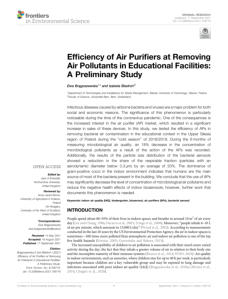Environmental studies 2021










Authors:
Krzysztof Doerffer, Patrycja Bałdowska-Witos, Michał Pysz,
Piotr Doerffer, and Andrzej Tomporowski.
Abstract:
Wind power plants are considered an ecologically-clean
source of energy. However, manufacturing processes
cannot be treated that way. Manufacturing processes
consume huge amounts of electrical and thermal energy
and a significant quantity of materials, e.g., steel, polymers,
oils, and lubricants. All of the above could be potentially
harmful to the environment. There are not many works
and publications regarding the life-cycle analysis of wind
power plants. This study’s objective is to use LCA (Life
Cycle Assessment) to the manufacturing and utilization of
a specific drag force-driven wind turbine.




Authors:
Patrycja Bałdowska-Witos, Krzysztof Doerffer, Michał Pysz,
Piotr Doerffer, Andrzej Tomporowski.
Abstract:
The conversion of wind kinetic energy into electricity in
innovative wind power plants emits practically no harmful
substances into the environment. However, the
production stage of its components requires a lot of
energy and materials. The biggest problem during the
production planning process of an innovative wind power
plant is the selection of materials and technologies and,
consequently, the waste generated at this stage.
Therefore, this publication aimed to conduct an
environmental analysis of the life cycle of elements of a
wind turbine through the life cycle assessment (LCA)
method.


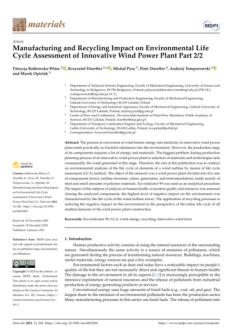

Authors:
Vicente Puig-Pons, Ester Soliveres, Isabel Pérez-Arjona,
Victor Espinosa, Pedro Poveda-Martínez, Jaime
Ramis-Soriano, Patricia Ordoñez-Cebrián, Marek
Moszy´nski, Fernando de la Gándara, Manuel Bou-
Cabo, José L. Cort, and Eladio Santaella.
Abstract:
Underwater noise has been identified as relevant pollution
affecting marine ecosystems in different ways. Despite the
numerous studies performed over the last few decades
regarding the adverse effect of underwater noise on
marine life, a lack of knowledge and methodological
procedures still exists, and results are often tentative or
qualitative. A monitoring methodology for the behavioral
response of bluefin tuna (Thunnus thynnus) when
exposed to ship and wind turbine operational noises was
implemented and tested in a fixed commercial tuna
feeding cage in the Mediterranean sea.




Authors:
Laura Florentina Gufatu , Stefano Menegon , Daniel
Depellegrin, Christian Zuidema, André Faaij, &
Claudia Yamu.
Abstract:
The North Sea basin is one of the busiest maritime areas
globally, with a considerable number of anthropogenic
pressures impacting the functioning of the marine
ecosystem. Due to growing EU ambitions to deploy large
offshore Wind Farm Projects (OWF) as part of the 2050
renewable energy roadmap, there is a key need for a
holistic understanding of OWF's potential impacts on the
marine ecosystem. The authors propose a holistic
Cumulative Effect Assessment methodology, applied using
a geospatial open-source software, to assess impacts of
OWF related pressures on selected seabed habitats, fish,
seabird, and mammal species.




Authors:
Robin Brabant, Yves Laurent, Bob Jonge Poerink, and
Steven Degraer.
Abstract:
Some species of bats migrate over long distances
between their summer roosts and winter areas.
During migration, many man-made obstacles, such as
wind farms, can pose a collision risk for bats. As it is
known that bats can fly over the open sea during
migration, and offshore wind farms can also be
problematic. We studied the presence of bats during
migration at several North Sea locations with the aim
of understanding the weather conditions triggering
bat migration at sea.



Authors:
Bettina Taylor, Mikhail Durkin, Linda Weilgart, Eleonora
Panella, Eleonora Panella, Russell Leaper, Nicolas
Entrup, Linda Weilgart, Denise Risch, Tobias Troll,
Stefanie Werner,
Abstract:
Anthropogenic underwater noise is a major conservation
problem that severely impacts marine species in all oceans.
Noise comes from offshore construction, transport as well
as resource exploration and extraction and adds to the
cumulative environmental impacts from other
anthropogenic pressures. The EU Marine Strategy
Framework Directive requires anthropogenic noise to be
at levels that do not adversely affect the marine
environment.
However, the focus has been on monitoring with no yet
widely agreed ways to assess whether good
environmental status is being achieved with respect to
underwater noise.




Authors:
Min Zhang, Xiaoli Shi, Feizhou Chen, Zhen Yang, & Yang
Yu.
Abstract:
The extent of intra-annual turnover in phytoplankton
communities is directly associated with the overall diversity.
However, the understanding of the underlying causes and
effects of intra- annual turnover remains limited.
The authors of this study performed a two-season
investigation of the phytoplankton composition in the
lakes of the Yangtze River catchment in China in spring
and summer 2012, which covered a regional spatial scale.




Authors:
Loïc Van Audenhaege, Emmeline Broad, Katharine R.
Hendry, and Veerle A. I. Huvenne.
Recent advances in deep-sea exploration with underwater
vehicles have led to the discovery of vertical environments
inhabited by diverse sessile fauna. However, despite their
ecological importance, vertical habitats remain poorly
characterized by conventional downward-looking survey
techniques. The authors present a high-resolution 3-
dimensional habitat map of a vertical cliff hosting a
suspension-feeding community at the flank of an
underwater glacial trough in the Greenland waters of the
Labrador Sea. A Remotely Operated Vehicle (ROV) with a
high-resolution multibeam echosounder was used to map
out the topography of the
deep-sea terrain, including the backscatter intensity. The
navigational accuracy was improved by combining the
USBL and the DVL navigation of the ROV. Multi-scale
terrain descriptors were derived and assigned to the 3D
point cloud of the terrain.


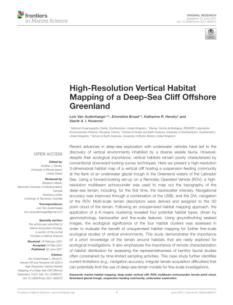

Authors:
M N Lyutikova, I M Dantsevich, S I Pankina
Abstract:
The intelligent underwater laboratory is designed to study
the properties of water, polluting factors with the
determination of the source of pollution. The laboratory
consists of a self-propelled autonomous vehicle with a
three-propulsion system and a static immersion and ascent
system. The multi-propulsion control system enables
maneuverability of the device. The solution of the
positioning problem by adjusting the coefficients and
obtaining new maneuverable capabilities of the device
provides performing the inspection on the bottom of the
vessel, the screw part, and taking water samples.




Authors:
Cong Wang, Zhen Li, Tan Wang, Xianbao Xu,
Xiaoshuan Zhang, Daoliang Li.
Intelligent fish farm tries to deal with the precise work of
increasing oxygen, optimizing feeding, reducing disease
incidences, and accurately harvesting through “replacing
humans with machines” to liberate the staffing completely
and realize green and sustainable aquaculture. This paper
reviews the application of intelligent fishery equipment,
IoT, edge, computing, 5G, and artificial intelligence
algorithms in modern aquaculture and analyzes the
existing problems and future development prospects.


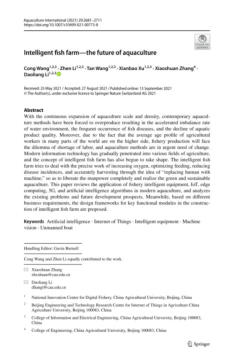

Authors:
Marie J. ZahnID, Kristin L. Laidre, Peter Stilz, Marianne H.
Rasmussen, Jens C. Koblitz.
Echolocation signals of wild beluga whales
(Delphinapterus leucas) were recorded in 2013 using a
vertical, linear 16-hydrophone array at two locations in the
pack ice of Baffin Bay, West Greenland. Individual whales
were localized for 4:42 minutes of 1:04 hours of
recordings. Clicks centered on the recording equipment
(i.e. on-axis clicks) were isolated to calculate sonar
parameters.


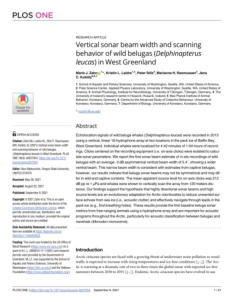

Authors:
Marie J. Zahn, Shannon Rankin, Jennifer L. K. McCullough,
Jens C. Koblitz, Frederick Archer, Marianne H.
Rasmussen, & Kristin L. Laidre.
Belugas (Delphinapterus leucas) and narwhals (Monodon
monoceros) are highly social Arctic toothed whales with
large vocal repertoires and similar acoustic profiles. Passive
Acoustic Monitoring (PAM), which uses multiple
hydrophones over large spatiotemporal scales, has been a
primary method to study their populations, particularly in
response to rapid climate change and increasing
underwater noise.




Authors:
Nausheen Mazhar, Ali Iqtadar Mirza, Zayanah Sohail Butt,
Muhammad Nawaz, Muhammad Ameer Nawaz
Akram.
Tarbela Dam is a giant, rock-fill dam on the Indus River in
Pakistan, built after a 1960 water treaty between India &
Pakistan. Its main functions are hydropower and irrigation,
and sedimentation is threatening it.
This study aims to monitor Tarbela reservoir's underwater
delta pivot point advancement and its forecast mapping.


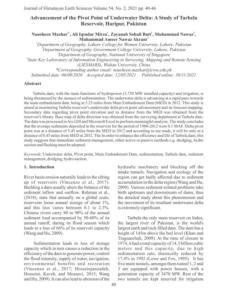

Author: Jesus Sanchez Rodrıguez
This document is a thesis that discusses the undulatory
swimming of aquatic animals at high Reynolds numbers,
where the inertial forces predominate. Aquatic
locomotion involves an intricate interaction between a
swimmer and its environment. Therefore, understanding
this process requires considering the fluid-structure
interaction of the swimmer moving within a fluid and the
sensory perception that feeds back its motile activity.




Author:
Inga Dehnert, Luca Saponari, Paolo Galli, and Simone
Montano
As part of a conservation management strategy, the need
for comprehensive and effective coral restoration projects
is accelerating in the face of coral reef ecosystem decline.
This study aims to expand the currently limited knowledge
base for restoration techniques in the Maldives by testing
the performance of mid-water rope nurseries in a lagoon
and a reef habitat.


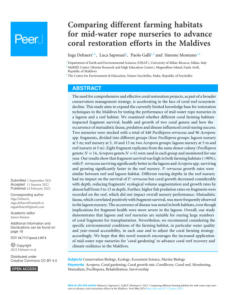

Publisher: European Maritime Safety Agency
Shipping is a primary contributor to anthropogenic noises,
which have increased faster than the size of the world
fleet. Despite their potentially harmful impacts on marine
fauna, the subject currently has a low priority over other
concerns, such as greenhouse gas (GHG) emissions.
Moreover, the absence of (international) policy and noise
limits is slowing progress on mitigation. Nevertheless,
efforts are being made to increase attention to the subject,
exemplified by the recent agreement at the International
Maritime Organisation (IMO) to review existing guidelines
and propose future work.


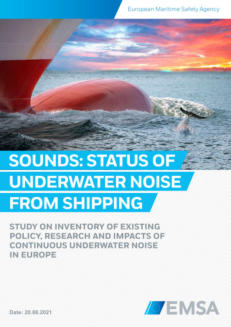

Authors:
Donatas Bagocius, Aleksas Naršcius, Olga Anne.
This paper presents an example of ship noise emission
modeling application for the narrow Klaipfida Harbour
area, along with the results obtained throughout
2015–2017.


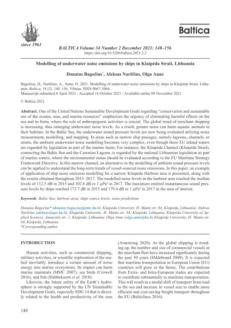

Authors:
Emilia Lilande, Mikael Svedendahl, Robin Nordstrom-
Larsson, Torbjorn Johansson, & Mathias H
Andersson.
This study aims to increase the knowledge regarding the
impact of underwater noise emission from maritime
activities on the marine environment by investigating the
soundscape in a specific area and developing a
framework for automatic acquisition of underwater
radiated noise from ships from opportunistic
measurement data.


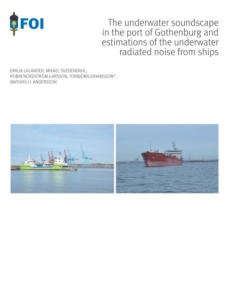

Author: Moustafa Elshafei, Abdelrahman Ibrahim, Amr
Helmy, Mostafa Abdallah, Amgad Eldeib,
Moustafa Badawy, and Sayed AbdelRazek
This paper presents a study to utilize Lake Nasser’s surface
for massive solar energy production while significantly
reducing the loss of water by evaporation from the lake
surface.



Author: A C Santos-Borja.
To deal with concerns about the environmental and social
impacts of the use of natural lakes for floating solar farms
in the Philippines, the Laguna Lake Development
Authority allowed several floating solar farms to operate
for one year, subject to various monitoring, including the
water quality.




Author: Tomasz Kolerski, Parisa Radan and Dariusz G
asiorowski.
One of the main elements in floating photovoltaic systems
is the forces imposed on the panels, and ice interaction
with the structures is considered the dominant load in the
northern regions. This study aims to identify the limitations
imposed on a floating PV structure located in the Lapino
Reservoir on the Radunia River in Poland, produced by the
wind action on the ice cover.


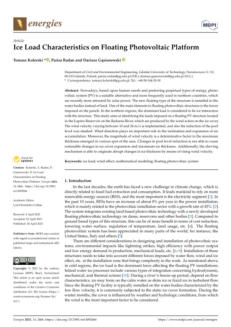

Authors:
Withaya Yongchareon, Sumlee Thongthew, and Pensiri
Juncharoent.
This study aimed to find the predicted equation for
forecasting the energy produced from photovoltaic
modules. The elements for this study were collected using
the data from the solar farm in Nakhon Ratchasima
province in Thailand regarding solar irradiation, ambient
temperature, modules' temperature, and wind velocity.


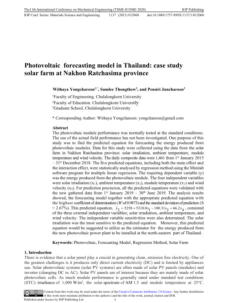

Author: Debajit Misra
This document makes a status of the problems arising
from the implementation of traditional land solar farms in
India, and the advantages of using floated structures in
place.




Authors: Surender Rangaraju, Osama Isaac, Abhijit
Ghosh, Phu Le Vo, Shakthi Bharath.
Solar panels have a maximum life of 20 to 25 years and
can release toxic substances that can be dangerous and
pollute the environment beyond these limits. For this
reason, they must be appropriately recycled after their end
of life. In this paper, the authors focus on the various
approach for recycling solar panel and their effectiveness.


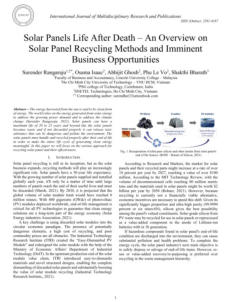

Authors: Ricardo Rebelo, Luís Fialho, Maria Helena
Novais.
This study discusses the potential degradation of electrical
insulation of photovoltaic cables and, consequently,
energy production losses and water contamination,
which is dangerous. For this reason, photovoltaic wires
with two different insulation materials were tested in
freshwater and artificial seawater to replicate real-life
conditions when FPV systems are located in reservoirs or
the marine environment.




Author: Chansatya Meas.
This thesis suggests recommendations to manage PV solar
waste properly in Thailand. For this reason, analyses from
the floating solar plant in the abandoned mining area,
Lianghuai 3 in China are used, considering that Thailand
can draw lessons learned from this country on how to
manage PV solar waste in an environmentally friendly
manner


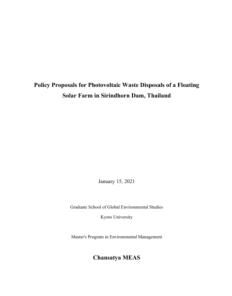
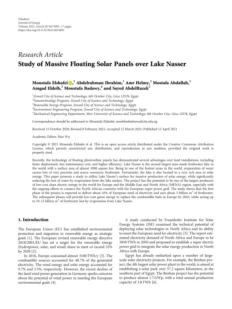



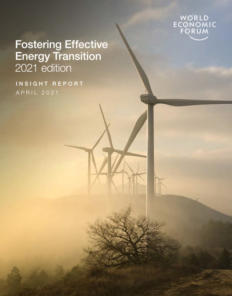

Author: Vanessa I. Stenvers, Rob E. Sherlock, Kim R.
Reisenbichler, & Bruce H. Robison
Gill parasites of coleoid cephalopods are frequently
observed during remotely operated vehicle (ROV) dives in
the Monterey Submarine Canyon. However, little
knowledge exists on the identity of the parasite species or
their effects on the cephalopod community. With the help
of ROV-collected specimens and in situ footage from the
past 27 years, the authors report on their identity,
prevalence and potential infection strategy.




Authors: Junyi Wang, Jiaming Hu, and Yun Chen.
This edition marks the 10th anniversary of the Energy
Transition Index (ETI). In the past decade,
The authors of this article propose a composite structure
based on a broadband low-frequency sound absorber of
air using aluminum mixed with rubber. the composite
structure possesses broadband low-frequency (<1,000 Hz)
sound absorption underwater, omnidirectional high
sound absorption coefficient under the oblique incidence
(0–75 degrees), and pressure resistance.




Authors: Antony J. Birchill, A. D. Beaton, Tom Hull, Jan
Kaiser, Matt Mowlem, R. Pascal, A. Schaap,
Yoana G. Voynova, C. Williams, & M. Palmer
The ability to make measurements of phosphate
concentrations at temporal and spatial scales beyond
those offered by shipboard observations provides new
opportunities for investigations of the marine phosphorus
cycle. This paper describes the first in situ dataset from an
underwater glider (Kongsberg Seaglider) equipped with a
Lab-on-Chip analyzer.


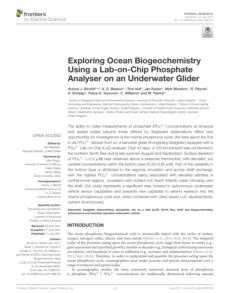

Authors: Ross Jones, Mari-Carmen Pineda, Heidi M.
Luter, Rebecca Fisher, David Francis,
Wojciech Klonowski, and Matthew Slivkoff
Sola
Hyper-spectral and multi-spectral light sensors were used
to examine the effects of elevated suspended sediment
concentration (SSC) on the quantity and quality (spectral
changes) of underwater downwelling irradiance in the
turbid-zone coral reef communities of the inner, central
Great Barrier Reef (GBR).


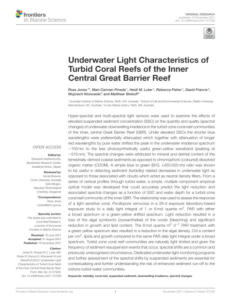

Authors: Tiago C. A. Oliveira, Ying-Tsong Lin, and
Michael B. Porter
Three-dimensional (3D) effects can profoundly influence
underwater sound propagation in shallow-water
environments, affecting the underwater soundscape.
Various geological features and coastal oceanographic
processes can cause horizontal reflection, refraction, and
diffraction of underwater sound. In this work, the ability of
a parabolic equation (PE) model to simulate sound
propagation in the highly complicated shallow water
environment of Long Island Sound (United States east
coast) is investigated.




Authors:
Mohammad Daher Hazaimeh, & Enas S. Ahmed
This paper provides a critical view of petroleum pollution
in seawater, the bioavailability of petroleum compounds,
the contribution of microorganisms in petroleum
degradation, and the mechanisms of degradation under
aerobic and anaerobic conditions. It considers different
biodegradation approaches such as biostimulation,
bioaugmentation, and phytoremediation.


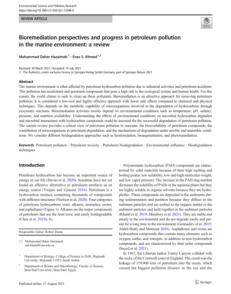

Authors:
Polina Galitskaya, Liliya Biktasheva, Sergey Blagodatsky, &
Svetlana Selivanovskaya
Petroleum pollution of soils is a major environmental
problem. Soil microorganisms can decompose a significant
fraction of petroleum hydrocarbons in soil at low
concentrations (1–5%). This characteristic
can be used for soil remediation after oil pollution.


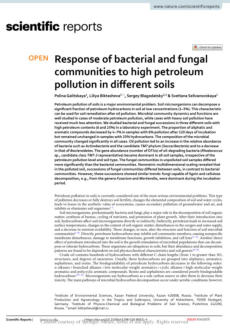

Authors: Zoyem Gouafo Mathurin & Talla Pierre Kisito
The MEWOU river, which runs through the town of
Bafoussam (Algeria), is one of the main sources of
drinking water and irrigation for the people who live
there. It is subject to intense agricultural and industrial
activity all along its banks.
Soap and oil factories generate pollution in the form of
liquid effluent which is released without any form of
treatment. Samples were analyzed during the months of
March, April and May of the year 2021 that show values
above those prescibed by the World Health Organization.


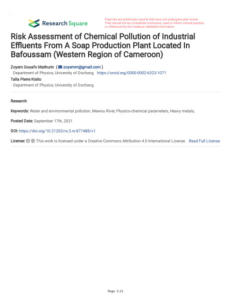

Authors:
Walter Cristiano, Cristina Giacoma, Mario Carere, Laura
Mancini
Chemical pollution, i.e. the release of anthropogenic
chemical substances into the environment, is a driver of
biodiversity loss. Although this issue has been widely
investigated in high-income countries of temperate
regions, there is a lack of data for tropical areas of middle-
or low-income countries, such as those in Eastern Africa.
A contribution in systemising the scientific literature related
to this topic is, therefore, urgently needed.


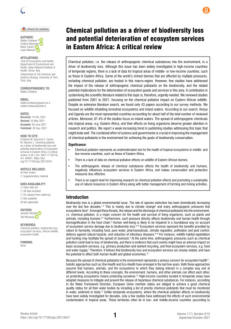

Authors: Q. Zhao, R.Z. Gao, D. Xia, L. Xia, W.Q. Zhu,
and W.N. Xu
The objective of this study is to understand the
characteristics of vegetation communities under different
vegetation eco-restoration models. Vegetation coverage,
dominant species, species composition, and species
diversity of vegetation community under different
vegetation eco-restoration modes were analyzed by field
survey.




Publisher: Ocean and Coastal research (57 scientists)
This paper presents major gaps and challenges for
implementing the UN Decade of Ocean Science for
Sustainable Development (2021-2030) in the
Mediterranean region. The authors make
recommendations on the scientific knowledge needs and
co-design actions identified during two consultations, part
of the decade preparatory-phase, framing them in the
Mediterranean Sea’s unique environmental and socio-
economic perspectives. According to the ‘Mediterranean
State of the Environment and Development Report 2020’
by the United Nations, despite notable progress, the
Mediterranean region is not on track to achieve and fully
implement the Sustainable Development Goals of Agenda
2030.




Authors: Xinguo Zhao, Shuge Sun, Wei Shi, Xuemei
Sun, Yan Zhang, Lin Zhu, Qi Sui, Bin Xia,
Keming Qu, Bijuan Chen, and Guangxu Liu
The increasing underwater noise generated by
anthropogenic activities has been recognized as a
significant and pervasive pollution in the marine
environment. Marine mussels are a family of sessile bivalves
that attach to solid surfaces via the abyssal threads. They
are widely distributed along worldwide coastal areas and
are of great ecological and socio-economic importance.
Studies found that anthropogenic noise negatively
affected many biological processes of marine organisms.
However, the potential impacts of anthropogenic noise
on mussel byssal attachment remain unknown.


.
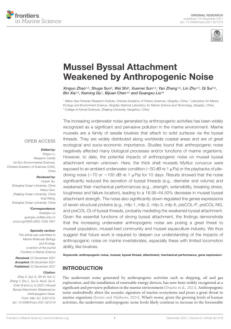


Author:
Benjamin J. Saunders, Ronen Galaiduk, Karina Inostroza,
Elisabeth M. V. Myers, Jordan S. Goetze, Mark
Westera, Luke Twomey, Denise McCorry, and Euan
S. Harvey
The aim of this study was to document the composition
and distribution of deep-water fishes associated with a
submarine canyon-valley feature. A work-class Remotely
Operated Vehicle (ROV) fitted with stereo-video cameras
was used to record fish abundance and assemblage
composition along transects at water depths between
300 and 900 metres.


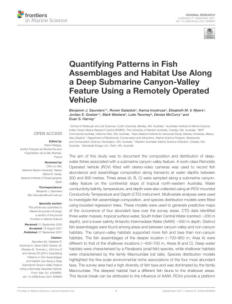

Authors: Tomasz Wolski, & Bernard Wisniewski
Understanding the characteristics of storm surges is
especially important in the context of ongoing climate
changes, which often lead to catastrophic events in the
coastal zones of seas and oceans.
For this reason, this paper presents the characteristics of
the Baltic Sea storm surges and trends in their occurrences
through the past 60 years. The study material was based
on hourly sea level readings, spanning the years 1961 to
2020, retrieved from 45 Baltic Sea tide gauges, as well as
air pressure and wind field data.


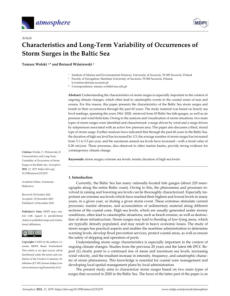

Click on the
octopus to return to
the top of the page

Authors: Marie-Lise Schläppy, Lucy M. Robinson, Victoria
Camilieri-Asch, & Karen Mille
This paper highlights the current state of research on
decommissioning oil and gas installations, identifies gaps
in ecological knowledge, and proposes areas for further
research. It emphasizes the need for a more
comprehensive understanding of the ecological impacts
of decommissioning, beyond just biodiversity, to include
aspects such as eco-toxicology, structural integrity, and
connectivity. This broader research focus is suggested to
better inform sustainable and equitable development
choices in the transition from offshore oil and gas to
marine renewable energy sectors.


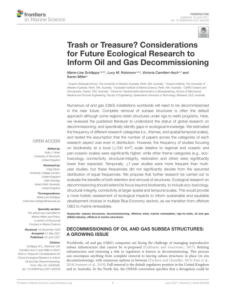

Authors: Euan S. Harvey, Stephanie L. Watts, Benjamin J.
Saunders, Damon Driessen, Laura A. F. Fullwood,
Michael Bunce, Se Songploy, Jes Kettratad,
Paweena Sitaworawet , Sarin Chaiyakul, Travis S.
Elsdon , & Michael J. Marnane
This document discusses the ecological and socio-
economic impacts of decommissioning offshore oil and
gas structures, specifically focusing on the potential
benefits of leaving these structures in the water rather
than removing them. The study surveyed fish assemblages
around platforms in the Gulf of Thailand to provide
insights into how fish utilize these structures and evaluate
the abundance, size, biomass, and economic value of the
associated fish populations.


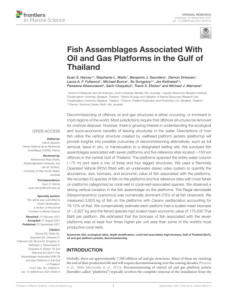

Authors: Sofie M. Van Parijs, Kyle Baker, Jordan Carduner,
Jaclyn Daly, Genevieve E. Davis, Carter Esch,
Shane Guan, Amy Scholik-Schlomer, Nicholas B.
Sisson, & Erica Staaterman
This paper discusses the importance and implementation
of passive acoustic monitoring (PAM) in offshore wind
energy development in US waters, highlighting the need
to understand the potential impacts of construction and
operation activities on endangered cetaceans and other
protected marine species. It emphasizes the role of PAM in
monitoring species presence, sound levels, and risk
mitigation.


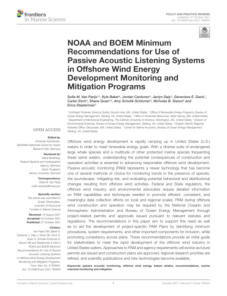

Authors: Mohammad Reza Shokri, Maryam Mohammadi
This paper provides an analysis and assessment of the
ecotourism potential and management strategies for
SCUBA diving on Kish Island. It discusses the evaluation of
the suitability and carrying capacity of various diving sites,
the impact of diving on reef health, and suggests
management strategies to ensure sustainable tourism to
inform about the current state of the diving industry on
Kish Island and propose measures to maintain the
ecological and aesthetic integrity of the reefs while
promoting the island as a suitable diving destination.

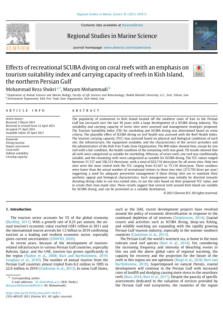

Authors:
Maria Flavia Gravina, Edoardo Casoli, Luigia
Donnarumma, Jacopo Giampaoletti, Federica Antonelli,
Carlotta Sacco Perasso, and Sandra Ricci
This study investigates the species composition and life-
history traits of organisms found on a submerged
archeological artifact, specifically a bronze Carthaginian
naval ram, to understand the ecological memory and
colonization patterns of benthic assemblages by
comparing the species found on the ram with those in
surrounding habitats. It highlights the significance of the
shipwreck as a proxy for marine biodiversity and
emphasizes the importance of the findings for
understanding marine biodiversity in the area of the
Aegadian archipelago.


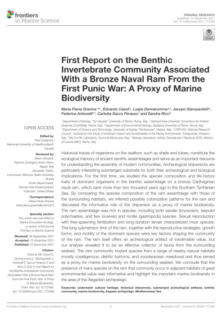
Authors: Oliver Bajt
The rapid increase in plastic waste and microplastics in
marine environments has led to significant problems,
including plastic degradation, accumulation in mussels
and fish, and toxicological effects. These pollutants pose
health issues after ingestion by marine organisms,
highlighting the need for improved studies on these
phenomena.


3 - From plastics to microplastics and organisms

Authors: S. Wajih A. Naqvi
This article examines oxygen distributions and
deoxygenation trends in three marginal seas: Persian Gulf,
Red Sea, and Andaman Sea. The Persian Gulf is well-
oxygenated, but is under immense anthropogenic stress
due to large nutrient and organic matter loading, causing
hypoxia in summer. The larger Red Sea is less affected, but
has a well-developed perennial oxygen minimum. Model
simulations suggest that amplified warming in the NWIO
may intensify the Arabian Sea oxygen minimum zone. In
the Andaman Sea, oxygen concentrations have declined
slightly but significantly between the early 1960s and
1995. New information is needed to assess further
changes over the past 25 years.


4 - Deoxygenation in Marginal Seas of the Indian Ocean
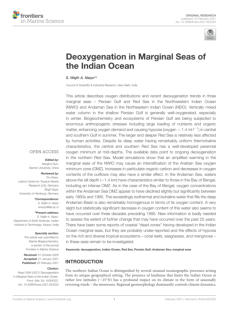


15 - Microplastics in the Mediterranean Sea: Sources, Pollution
Intensity, Sea Health, and Regulatory Policies
Authors: Shivika Sharma, Vikas Sharma, and Subhankar
Chatterjee
Microplastic pollution is a global threat, with the
Mediterranean Sea being a target hotspot due to its high
concentration of microplastics. The region's semi-enclosed
morphology and waste generation activities from
surrounding countries make it highly vulnerable. The
ingestion of microplastics by marine animals is a concern,
as they act as vectors for harmful pollutants. This review
discusses the persistence of microplastics in surface water,
sediments, and deep sea-floor, sources of synthetic
materials, and the fate of threatened species and the
plastisphere community in the region.
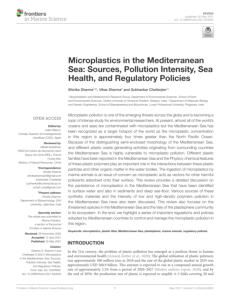



25 - Effect of Marine Pollution on Coastal Environment in Nigeria
seaports
Author: Dike, Remigius Amarachi and Achoru, Fred
Emeka
This study evaluates the impact of marine pollution on the
coastal environment in Nigeria's Seaports. It examines the
effects of ocean dumping pollution on marine personnel,
land runoff pollution on aquatic resources, and ocean
mining pollution on marine ecosystems. This research
used a descriptive survey method and involved 371
respondents from three sea ports. Results showed adverse
effects of ocean dumping, land runoff, and ocean mining
pollution on marine personnel, aquatic resources, and
ecosystems. The study recommends raising awareness
and implementing prevention measures to protect the
marine environment in Nigeria.
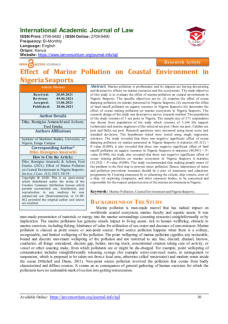


26 - Deep-sea biodiversity at the extremes of the Salas y Gomez and
Nazca ridges with implications for conservation
Authors: Alan M. Friedlander, Whitney Goodell, Jonatha
Giddens, Erin E. Easton, Daniel Wagner
This study, conducted in 2011 and 2013, characterized
the community composition of mesophotic and deep-sea
demersal fauna at seamounts in the Salas y Gomez and
Nazca ridges. It identified 55 unique invertebrate taxa and
66 unique fish taxa. The faunal community structure was
highly dissimilar between and within subregions, with
dogfish sharks accounting for the greatest dissimilarity.
This study also supports the high biodiversity and
conservation value of the ridges, but warns that the
majority lie outside national jurisdictions and face threats
from overfishing, plastic pollution, climate change, and
deep-sea mining.
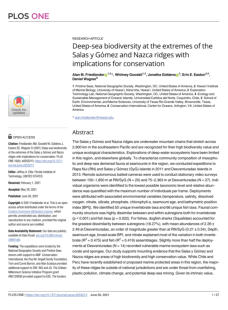


30 - Far-Field Effects of Impulsive Noise on Coastal Bottlenose
Dolphins
Authors: Oihane Fernandez-Betelu, Isla M. Graham, Kate
L. Brookes, Barbara J. Cheney, Tim R. Barton,
and Paul M. Thompson
The increasing levels of anthropogenic underwater noise,
particularly from offshore renewable energy developments
and seismic exploration, pose a significant threat to marine
life. However, the far-field effects of impulsive noise are
poorly understood, leading to uncertainty in predicting the
impacts of these developments on marine mammal
populations. This study investigated the far-field effects of
impulsive noise from offshore activities using a 10-year
dataset on coastal bottlenose dolphins from 2009 to 2019.
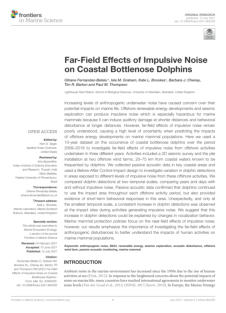


31 - Bacterial and Bacteriophage Antibiotic Resistance in Marine
Bathing Waters in Relation to Rivers and Urban Streams
Authors: Laura Sala-Comorera, Tristan M. Nolan, Liam J.
Reynolds, Anjan Venkatesh, Lily Cheung, Niamh
A. Martin, Jayne H. Stephens, Aurora Gitto,
Gregory M. P. O’Hare, John J. O’Sullivan, and
Wim G. Meijer
This study compares the bacterial and bacteriophage ARG
profiles of two rivers and two small urban streams in
Dublin Bay. It found that human contamination is the
main source of pollution in both rivers and streams.
Nearshore marine bathing waters are strongly influenced
by urban rivers and streams, as they share a similar ARG
profile. Bacterial ARG levels were significantly reduced in
the marine environment, while bacteriophage ARG levels
were not significantly different.

Authors: Y Lan Pham, and Jonathan Beauchamp
The detection of chemical compounds in exhaled human
breath offers potential for determining physiological state,
diagnosing diseases, and assessing environmental
exposure. Despite challenges in sampling and analysis,
breath is a desirable medium for metabolomics due to its
non-invasive, convenient, and limitless availability. This
review discusses breath analysis, biomarkers targeted, and
future tests in breath research.


40 - Breath Biomarkers in Diagnostic Applications
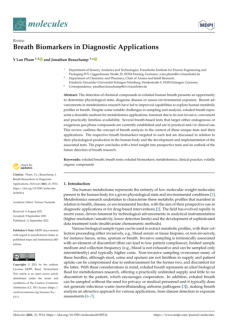


55 - A Global Ocean Oxygen Database and Atlas for Assessing and
Predicting Deoxygenation and Ocean Health in the Open and
Coastal Ocean
Authors: Marilaure Grégoire et al. (55 scientists)
This paper calls for a coordinated international effort to
build an open-access Global Ocean Oxygen Database
and ATlas (GO2DAT) that adheres to FAIR principles.
GO2DAT will combine data from coastal and open ocean
platforms, adopting a community-agreed metadata
format and quality control procedures. It will support
advanced data analysis and biogeochemical models for
ocean O2 changes and deoxygenation trends. This
project will offer unprecedented spatial and temporal
resolution for data synthesis products, supporting model
assessment, improvement, evaluation, climate and ocean
health indicators, decision-making processes, and
management tools.



56 - Long-Term Patterns of Noise From Underwater Explosions and
Their Relation to Fisheries in Southern California

Authors: Anna Krumpel, Ally Rice, Kaitlin E. Frasier, Fairlie
Reese, Jennifer S. Trickey, Anne E. Simonis, John
P. Ryan, Sean M. Wiggins, Annette Denzinge,
Hans-Ulrich Schnitzler, and Simone Baumann-
Pickering
Acoustic deterrents, like “seal bombs,” are used in
Southern California to protect fisheries from marine
mammals but contribute to increased underwater noise.
Data from 2005 to 2016 show high numbers of
underwater explosions linked to the market squid fishery,
primarily at night. This study highlights a decline in seal
bomb use, likely due to market changes and regulations,
and emphasizes the need for further research and
environmental regulations on their impact on marine life.


Authors: Ewa Bragoszewska, and Izabela Biedron
This study examines the growing concern regarding
airborne infectious diseases, particularly highlighted
during the coronavirus pandemic, and evaluates the
effectiveness of air purifiers (APs) in reducing bacterial
contamination in indoor environments, specifically within
educational settings in Upper Silesia, Poland. Over a six-
month period in the 2018/2019 cold season, a notable
18% reduction in microbiological pollutants and a 20%
decrease in respirable bacterial aerosol particles were
observed, with evidence suggesting that human activity is
the primary source of indoor bacteria. T



